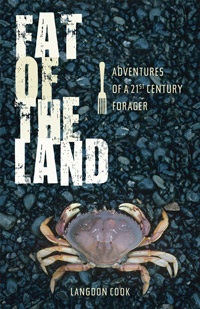
feature-image, l
(article, Linda Ziedrich)
[%pageBreakSettings nobreak=true] “There is a saving streak of the primitive in all of us,” wrote Euell Gibbons, who introduced the art of foraging to the citified masses in the 1960s and 1970s. Hunting was as popular a sport then as now, but foraging was easier and cheaper, and ought to be practiced more, Gibbons believed. You didn’t have to go to the mountains or virgin forest to gather wild foods; you could just head out your door and take a walk. Fence rows, stream banks, and even vacant lots could provide the raw material for tasty, nutritious, and unusual table fare. In books and magazine articles, Gibbons told how to identify and harvest dozens, perhaps hundreds, of wild species, and how best to cook them up. The Pacific Northwest now has its own modern Euell Gibbons in Langdon Cook, author of Fat of the Land: Adventures of a 21st Century Forager. Although Cook grew up on factory food in suburban Connecticut, he certainly has a streak of the primitive. Cook first came to the Northwest to sailboard on the Columbia River. He returned a few years later to study creative writing and then took an editorial job with Amazon, but couldn’t stay tethered to a desk for long. Cook likes to write, and he writes well, but most of all, he likes outdoor adventure. In and near his current hometown of Seattle, Cook gathers plants that Gibbons also loved: watercress, fiddleheads, stinging nettles, and dandelions. He “jigs” for squid off a Seattle pier, along with Nicaraguans, Cambodians, and Ukrainians. (A jig is “like a miniature cigar” with a circle of hooks at the end, meant to entangle rather than impale a squid.) He casts for silver salmon from a Seattle beach, day after day, until he finally lands one. [%image feature-image float=right width=400 caption="Langdon Cook created his clam-chowder recipe to be just like his grandmother's."] Cook forages farther afield, too. He drives hundreds of miles to a fire-blackened forest to gather morels, avoiding crowds of recreational mushroom hunters and dodging potentially dangerous pros. He camps on the Washington coast in winter and wanders the beach at night with hundreds of strangers, all hoping to nab a few precious razor clams with their PVC suction guns. He keeps an eye out for bears while picking huckleberries in the Blue Mountains and eastern Cascades. He catches steelhead trout (mostly hatchery-grown, but wild enough after months or years in the Pacific) on the Rogue River in southwestern Oregon and, early on a June morning, he gets in line at Bonneville Dam on the Columbia River to await the starting gun for shad season. [[block(sidebar). h1.Featured recipes ]] The more daring the foraging adventure, the more fun Cook seems to have. Instead of catching crabs by dropping pots from a boat, he likes to dive into the Puget Sound, “chase them down like a seal, pin them against the bottom,” and then try to grab the crabs’ back legs without getting his hand sliced by the pincers. With his friend Dave, he deigns to use a boat to catch spot shrimp, but it’s a borrowed canoe on a windy day in the treacherous fjord known as Hood Canal, and the men must pull up hundreds of feet of rope by hand to collect their pots. Most frighteningly, Cook free-dives as deep as 30 feet in the cold water of Puget Sound to spear enormous lingcod, “long and snakelike, with a large mouth of teeth.” In his pensive moments, Cook writes lovely prose about nature. And while readers can learn plenty from Fat of the Land about where to find and how to harvest 15 or so edible wild species, Cook doesn't forget to tell how to prepare them for supper, too. Having worked to live up to his name, Cook closes each chapter with a good basic recipe. But Fat of the Land is more memoir than nature guide or cookbook; readers hoping for a comprehensive index will be disappointed. Instead, it's a collection of adventure stories: the intrepid narrator challenging the wild, with beer-drinking buddies sporting monikers like Trouthole and Warpo. Foraging, for Cook, is a most manly sport. But foraging Langdon Cook–style gets ever more difficult and expensive as our swelling human population and our pollutants limit safety, seasons, and harvest allowances. Cook doesn’t gloss over the ecological questions involved; he is conservation-minded. But he clearly enjoys the challenge of getting his tastes of the dwindling fat of our land. Less daring readers, like me, may turn from Cook back to Euell Gibbons, who caught fish and hunted game but mostly gathered weeds — weeds like mustard and winter cress and chicory, wild cherries and elderberries and crabapples. These neglected plants still line our roadsides and decorate our vacant lots. We can pick their foliage and fruits and enjoy them, thank goodness, without fearing that we may never taste such things again. p(bio). [/author/LindaZiedrich "Linda Ziedrich"] has written several cookbooks. She keeps a large organic garden on her family homestead east of Albany, Oregon.

feature-image, l

featurette-image, l

promo-image, l

reference-image, l